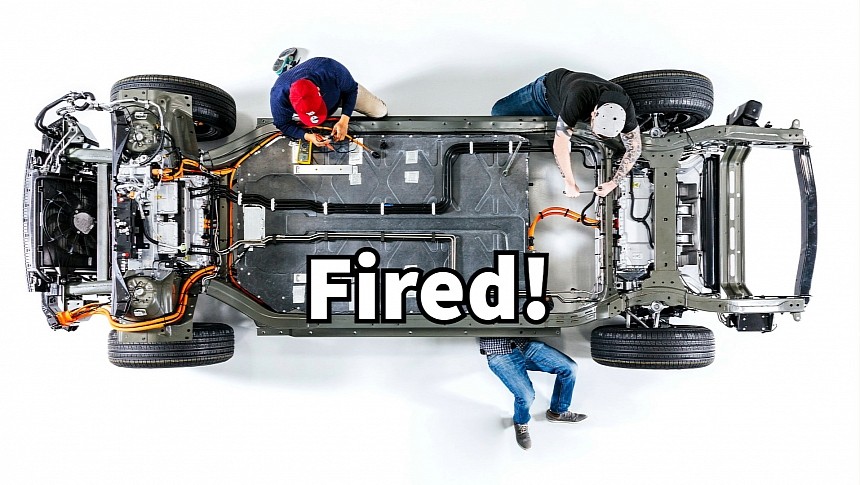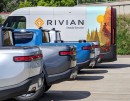Rivian has reportedly laid off critical members of its long-range battery cell development team, including Victor Prajapati, who led Rivian's in-house battery cell development. The move signals that Rivian has abandoned plans to develop its own battery cells and will instead use third-party providers.
Rivian is busy preparing the R2 line of electric vehicles while, at the same time, readying a welcome refresh to its R1 lineup. Speaking recently at the Barclay's Automotive Conference, the company's CFO Claire McDonough revealed that Rivian is working on a new type of battery. This should be lighter and cheaper to manufacture, hinting at improved packaging and, more specifically, at a structural battery pack.
Rivian also announced switching to using lithium-iron-phosphate (LFP) cells for its entry-level batteries and those powering the delivery vans. This should make Rivian EVs even more affordable, thanks to their lower manufacturing costs and cheaper materials. However, Rivian has relied on battery cells provided by third-party suppliers, mostly South Korea's Samsung SDI. It's unclear which company will supply its LFP cells, but it's likely Rivian partnered with an industry heavyweight like CATL or BYD.
This doesn't mean Rivian hasn't pursued developing its own cells, like Tesla does. In December 2020, the EV startup hired Victor Prajapati of Tesla to lead Cell Engineering. Prajapati gained experience building the Cell Manufacturing Division at Tesla, and he was supposed to fill a similar role at Rivian. The EV startup was serious about developing its own cells at the time. However, plans have changed in light of recent financial constraints, as Rivian signaled abandoning cell-development plans.
We don't know how advanced the in-house cell development team was, but Rivian's coffers are not infinite. The EV startup had to make a tough decision, and in-house cell development didn't seem like a safe bet, especially as Rivian is still struggling to make a profit. The company was using third-party battery cell suppliers anyway, so the battery team was put on the chopping board.
According to Benzinga, Rivian laid off 20 employees working on research and development of future battery technologies. A Rivian spokesperson confirmed the layoffs, saying that it affected only 8% of the company's battery team. The spokesperson declined to comment on Prajapati's departure but said the move reflects a decision to pause new cell development in-house. Apparently, Rivian wants to focus its resources on the R2 program, and battery cell development is using precious resources.
The R2 vehicles are scheduled to launch in 2026, with a prototype expected to be unveiled in a couple of months. The first model of the lineup will be a smaller SUV that will still embody Rivian's adventurous spirit. However, it will be priced more affordably in the $45,000-$50,000 bracket, putting it on a collision course with the Tesla Model Y. Rivian also plans a smaller pickup, mirroring its current range, which also comprises a pickup truck and an SUV.
Rivian also announced switching to using lithium-iron-phosphate (LFP) cells for its entry-level batteries and those powering the delivery vans. This should make Rivian EVs even more affordable, thanks to their lower manufacturing costs and cheaper materials. However, Rivian has relied on battery cells provided by third-party suppliers, mostly South Korea's Samsung SDI. It's unclear which company will supply its LFP cells, but it's likely Rivian partnered with an industry heavyweight like CATL or BYD.
This doesn't mean Rivian hasn't pursued developing its own cells, like Tesla does. In December 2020, the EV startup hired Victor Prajapati of Tesla to lead Cell Engineering. Prajapati gained experience building the Cell Manufacturing Division at Tesla, and he was supposed to fill a similar role at Rivian. The EV startup was serious about developing its own cells at the time. However, plans have changed in light of recent financial constraints, as Rivian signaled abandoning cell-development plans.
We don't know how advanced the in-house cell development team was, but Rivian's coffers are not infinite. The EV startup had to make a tough decision, and in-house cell development didn't seem like a safe bet, especially as Rivian is still struggling to make a profit. The company was using third-party battery cell suppliers anyway, so the battery team was put on the chopping board.
According to Benzinga, Rivian laid off 20 employees working on research and development of future battery technologies. A Rivian spokesperson confirmed the layoffs, saying that it affected only 8% of the company's battery team. The spokesperson declined to comment on Prajapati's departure but said the move reflects a decision to pause new cell development in-house. Apparently, Rivian wants to focus its resources on the R2 program, and battery cell development is using precious resources.
The R2 vehicles are scheduled to launch in 2026, with a prototype expected to be unveiled in a couple of months. The first model of the lineup will be a smaller SUV that will still embody Rivian's adventurous spirit. However, it will be priced more affordably in the $45,000-$50,000 bracket, putting it on a collision course with the Tesla Model Y. Rivian also plans a smaller pickup, mirroring its current range, which also comprises a pickup truck and an SUV.







